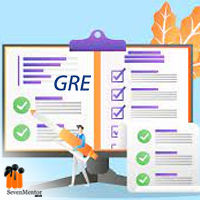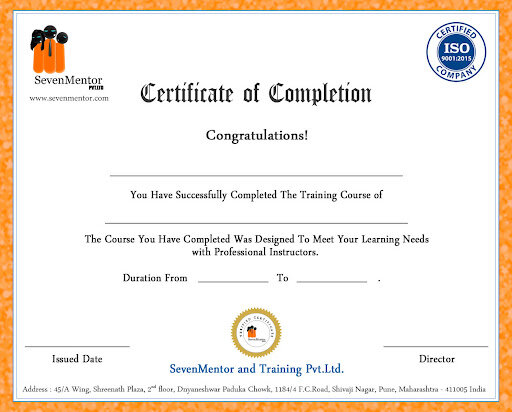GRE
The Graduate Record Examination, or GRE, is an important part of the graduate school or master's degree application process. The GRE is a globally recognised multiple-choice computerized test that is used to gain entrance to degree programmes and management programmes.
Call The Trainer
Batch Timing
- Regular: 2 Batches
- Weekends: 2 Batches
Request Call Back
Class Room & Online Training Quotation
About GRE
A good GRE score affects your chances of getting into college or graduate school right away. ETS developed the GRE to give standardized metrics for graduate and management schools to compare students' aptitude and readiness for bachelor's degree academic work. Admissions officers at universities and schools of management analyze your readiness for the rigors of a professional degree program by looking at your GRE score, as well as your educational qualifications and supporting paperwork.
Getting to know the GRE
The Graduate Record Examination, or GRE, is a standardized test developed and administered by Educational Testing Service (or ETS). It is a requirement for admission to a variety of graduate programs in English-speaking countries including the United States and Canada. The GRE Course in Ahmedabad is a wonderful multi-opportunity score for people who want to pursue business-related programs and connect their academic and professional goals. It is crucial to perform well on the GRE because it is so important in admissions decisions. On the other hand, a high GRE score does not ensure admission to a business school. The reasoning, critical thinking, quantitative reasoning, and analytical writing abilities of the test-verbal taker are evaluated.
Biochemistry, biology, chemistry, cell and molecular biology, computer science, mathematics, physics, English literature, and psychology are among the subjects offered at GRE classes in Ahmedabad. The questions on the
GRE Training in Ahmedabad are designed to mirror the type of thinking and talents needed to succeed in difficult graduate school programs.
The GRE General Test assesses a candidate's ability to read, write, and solve problems in three areas: reading, writing, and math.
Reasoning through verbal skills: The Verbal Reasoning section assesses your ability to verbally analyze and solve problems.
By summarizing the text, you can draw rationale from limited facts.
Individual words, paragraphs, and complete texts must be comprehended.
Recognize the author's point of view.
Mathematical Reasoning
The Quantitative Reasoning section assesses your ability to use mathematical models to solve issues. To grasp and analyze numerical data, apply principles from elementary mathematics.
Through Analytical writing.
The Analytical Writing section assesses your ability to maintain a focused and organized discussion.
To clearly discuss complex issues, utilize appropriate examples and logic, and express concepts.
Examine both the claims and the evidence that backs them up.
The GRE subject test assesses a candidate's understanding of a particular academic field. This test is only open to applicants who have previously studied one of the seven fields indicated below. Among the subjects covered are biochemistry, cell and molecular biology, biology, chemistry, English literature, mathematics, physics, and psychology.
GRE Scores in Admissions: Advantages and Disadvantages
The GRE® General Test and GRE® Subject Tests were designed to bring value to the admissions decision-making process. Understanding what the tests were designed to measure and anticipate can help administrators and professors assign a proper role for test outcomes without expecting them to do more than they can.
What is the GRE, exactly?
The Graduate Record Examination (GRE) General Test is a standardized test administered in the United States by Educational Testing Services (ETS). The GRE General Test evaluates your academic readiness for thousands of graduate and business schools throughout the world. Admission to master's, MBA, specialized master's in business, and PhD programmes at universities around the world requires these test results. The ETS representative in India is in charge of administering the exams. Graduate schools and universities use GRE scores as one of several variables to judge an applicant's readiness for study in a range of fields. Although a high GRE score does not guarantee admission to any graduate school or institution outside of the United States, it can be utilized as a stepping stone. Thousands of graduate/business schools throughout the world have used GRE scores (along with the candidate's undergraduate grades and other qualifications) for admission to their graduate programmes for over 60 years. The GRE is administered by ETS in two separate tests around the world.
Online Classes
Candidates seeking a rewarding job in their field can gain the most from online GRE training in Ahmedabad. The SevenMentor Institute is a fantastic online training programme that offers students a comprehensive curriculum. Our service helps job seekers choose the finest career options from the available training. SevenMentor Institute is one of the best training institutes. Students will be guided via online mini-projects by our professors, and their knowledge and abilities will be evaluated on a regular basis. As a result, our online GRE Course in Ahmedabad will not only be adaptive, but will also supply you with essential information. Our educators design a method in this regard.
Course Eligibility
Freshers
Students
Bachelors & Graduates
Any professional person
Abroad studying students and professionals
Candidates willing to learn something new.
Syllabus of GRE
About the GRE
The Graduate Record Examination, or GRE, is an important step in the
graduate school or business school application process. The GRE is a
a multiple-choice, computer-based, standardized exam that is often
required for admission to graduate programs and graduate business
programs (MBA) globally.
The GRE is developed and administered by test maker ETS to provide
graduate and business schools with common measures for comparing
applicants' qualifications and preparedness for graduate-level academic
work. Graduate school and business school admissions committees look
at your GRE score, along with your academic record and supporting
materials, to assess your readiness for the rigors of graduate academic
study.
What's the takeaway? A high score on the GRE will have a direct,
positive impact on your graduate or business school application.
What is the GRE exam?
The GRE exam measures your command of basic arithmetic, algebra,
geometry, and data analysis as well as college-level vocabulary.
More importantly, it measures your ability to analyze and evaluate
written material, think critically, and solve problems. Learn more about
what's on the GRE here.
You will receive three scores on the GRE:
Analytical Writing <<
Verbal Reasoning <<
Quantitative Reasoning <<
These scores are generated by the following sections:
1 Analytical Writing Assessment section
2 Verbal Reasoning sections
2 Quantitative Reasoning sections
In addition, you will see one of the following sections:
Unscored (may be either Verbal Reasoning or Quantitative Reasoning)
Research (used for ETS research purposes)
The Quantitative Reasoning and Verbal Reasoning sections are each
scored on a scale of 130 to 170. The mean score for Verbal Reasoning
is 151, and the mean score for Quantitative Reasoning is 153.
The Analytical Writing Assessment is scored from 0 to 6 in half-point
increments, and the mean score is 4.0.
[ RELATED: How difficult is the GRE? ]
ANALYTICAL WRITING
Number of questions:
Two separately timed tasks: one "Analyze an Issue" task and one
"Analyze an Argument" task.
Minutes to complete Analytical Writing:
30 minutes per task; 60 minutes total
Score range: 0 to 6
The Analytical Writing Assessment, or “essay” section, measures
whether you can articulate your thoughts and responses to complex ideas
in a clear and reasoned way. Formulating a well-supported thesis in
response to new and unfamiliar topics and key to doing well on
Analytical Writing.
During the two, separately timed tasks in Analytical Writing, you will be
asked to “Analyze an Issue” and to “Analyze an Argument.” For the
“Analyze an Issue” task, you will read an opinion on a topic of general
interest and be given instructions on how to respond to the issue at hand.
For the “Analyze an Argument” task, you will need to consider an
argument according to instructions given in the prompt.
VERBAL REASONING (VERBAL)
Number of questions:
6 Text Completion questions, 4 Sentence Equivalence questions, 10
Reading Comprehension questions, 20 total questions per section
Minutes to complete Verbal Reasoning:
30 minutes per task; 60 minutes total
Score range:130 to 170
The Verbal section of the GRE tests your ability to analyze written
material, as well as relationships among component parts of sentences,
including words and concepts. Verbal Reasoning questions appear in
several formats:
TEXT COMPLETION
Text Completion (TC) questions ask you to fill in the blank to complete
sentences. Variations include 1-, 2-, and 3-blank questions. You'll
encounter approximately six of these in each Verbal section, and you
should aim to complete each in about 1–1.5 minutes. To master these,
you'll need to build your vocabulary as well as develop your skill at using
context clues from the sentence to make predictions for the blanks.
There is no partial credit: you must answer correctly for all blanks to
receive points for these questions.
SENTENCE EQUIVALENCE
Sentence Equivalence (SE) questions require you to fill in a single blank
with two choices that create two coherent sentences that are logically
similar in meaning. You will encounter approximately four SE questions
in each Verbal section. Aim to complete each in about 1 minute. As with
TC questions, you'll need to work on building your vocabulary and
identifying context clues in order to master SE questions
READING COMPREHENSION
Reading Comprehension (RC) questions are based on passages of one
or more paragraphs that develop an explanation or argument on a topic.
RC questions require you to understand central ideas presented in the
text and the structure of a text, as well as to research details in the passage
and draw valid inferences from it. RC questions require strategic reading
and paraphrasing skills.
Each Verbal section will contain approximately 10 RC questions
associated with five different passages, and you should aim to spend an
average of 1–3 minutes on reading a passage and 1 minute per question.
QUANTITATIVE REASONING (QUANT)
Number of questions:
7–8 Quantitative Comparison questions
12–13 Problem Solving questions
20 total questions per section
Minutes to complete Quantitative Reasoning: 35 minutes per section
Score range: 130 to 170
The Quant section of the GRE tests your basic quantitative skills, as
well as your ability to reason and solve problems with quantitative
methods. You'll see questions covering basic arithmetic, algebra,
geometry, and data analysis. These topics are typically covered in
high school. You will not see trigonometry, calculus, or any other
high-level math.
[ GOOD TO KNOW:
Rates and Work Questions & High-Yield Topics ]
Quantitative Reasoning questions appear in several formats:
QUANTITATIVE COMPARISON
Quantitative Comparison (QC) questions ask you to compare two
quantities—Quantity A and Quantity B—and to identify the relationship
between the two. You'll likely see about 7–8 of these in each Quant
section. To master these, be familiar with the QC answer choices and
with shortcut methods that allow you to compare rather than calculate.
PROBLEM-SOLVING
The most common Problem Solving (PS) questions are standard
multiple-choice questions, with five choices and one correct answer.
Variants include questions that ask you to select one or more answers
from a list of choices (multiple-choice all-that-apply) and questions that
ask you to enter your answer in a box (numeric entry.) To master PS
questions, be familiar with the math concepts that are tested as well as
strategies that allow you to approach solving efficiently.
There are also a handful (typically three per section) of Problem
Solving questions associated with one or more charts. These Data
Interpretation (DI) questions work like other PS Qs, but it's important
to note that gleaning the information correctly from the graphs is the
key to answering them.
Trainer Profile of GRE
Our Trainers explains concepts in very basic and easy to understand language, so the students can learn in a very effective way. We provide students, complete freedom to explore the subject. We teach you concepts based on real-time examples. Our trainers help the candidates in completing their projects and even prepare them for interview questions and answers. Candidates can learn in our one to one coaching sessions and are free to ask any questions at any time.
- Certified Professionals with more than 8+ Years of Experience
- Trained more than 2000+ students in a year
- Strong Theoretical & Practical Knowledge in their domains
- Expert level Subject Knowledge and fully up-to-date on real-world industry applications
GRE Exams & Certification
SevenMentor Certification is Accredited by all major Global Companies around the world. We provide after completion of the theoretical and practical sessions to fresher’s as well as corporate trainees.
Our certification at SevenMentor is accredited worldwide. It increases the value of your resume and you can attain leading job posts with the help of this certification in leading MNC’s of the world. The certification is only provided after successful completion of our training and practical based projects.
Proficiency After Training
- Forge questions more meticulously and will be able to ask for/provide information utilizing new methodology, with some degree of control.
- Better use of phrases to express agreements and disagreements making the content effective.
- New vocabulary in context while stating decisions, predictions, and opinions.
- Understand the main points in texts and identify the specific information required.
- Understand the transitions of tenses with proper pronunciation of irregular verbs.
- Make introductions, ask and answer questions with accuracy.
Key Features
Skill level
From Beginner to Expert
We are providing Training to the needs from Beginners level to Experts level.
Course Duration
12 weeks
Course will be 90 hrs to 110 hrs duration with real-time projects and covers both teaching and practical sessions.
Total Learners
2000+ Learners
Training in language lab available.
Audio-Visual Training modules on LED screens.
Get completed tasks reviewed by certified IELTS experts.
Receive a customized report on your modular tasks indicating your strengths and weaknesses and strategies for improvement via a personalized action plan
Understand the calculations of scores in every task.
Learn Advanced Grammar techniques and English phrasing
Comprehensive preparations with a focus on all L-R-W-S quadrants (Listening, Reading, Writing, Speaking).
Weekdays as well as Weekend batches available.
Advanced vocabulary building exercises in every session.
Frequently Asked Questions
Batch Schedule
| DATE | COURSE | TRAINING TYPE | BATCH | CITY | REGISTER |
|---|---|---|---|---|---|
| 07/04/2025 |
GRE |
Online | Regular Batch (Mon-Sat) | Ahmedabad | Book Now |
| 08/04/2025 |
GRE |
Online | Regular Batch (Mon-Sat) | Ahmedabad | Book Now |
| 05/04/2025 |
GRE |
Online | Weekend Batch (Sat-Sun) | Ahmedabad | Book Now |
| 05/04/2025 |
GRE |
Online | Weekend Batch (Sat-Sun) | Ahmedabad | Book Now |
Students Reviews
In the classes, excellent mentoring was offered.
- Shravani Tatke
The mentors did an outstanding job of teaching the pupils everything right from the start.
- Priya Rai
The classes were quite beneficial and presented us with a wealth of knowledge.
- Vivek Moghe
Course video & Images



Corporate Training
The GRE is a globally recognised test that is required for admission to most professional degree programmes in the United States for international certificate and graduate business applicants who wish to pursue any degree programme, Master of Business Administration, distinct business programme, or Doctoral degree. SevenMentor Institute's Corporate GRE Training in Ahmedabad is helping you to save time and minimize traffic for your staff. In the MCQ, IELTS, GMAT, Rug, and TOEFL, our state-of-the-art design, together with our professional teaching pool, has outperformed their peers. The GRE is a globally recognised test that is required for admission to most professional degree programmes in the United States for international certificate and graduate business applicants who wish to pursue any degree programme, Master of Business Administration, distinct business programme, or Doctoral degree. SevenMentor Institute's Corporate GRE Course in Ahmedabad is usually held in Bangalore's major business districts, helping you to save time and minimize traffic for your staff. In the MCQ, IELTS, GMAT, Rug, and TOEFL, our state-of-the-art design, together with our professional teaching pool, has outperformed their peers.
Our Placement Process

Eligibility Criteria

Placements Training

Interview Q & A

Resume Preparation

Aptitude Test

Mock Interviews

Scheduling Interviews

Job Placement

Related Courses
Have a look at all our related courses to learn from any location
French is profusely known as a language of Art, Culture, and Literature. France has won more Nobel prizes for Literature and Arts as compared to other countries around the globe....
Train The Trainer, also referred to as TTT, is an education model in which one identifies how to teach, train or mentor a set of people pursuing higher education or...
A section to converse effectively. The world's most widely spoken language is the Spoken English Course in Pune. Even if we mention the language that is used in India for...
Request For Call Back
Class Room & Online Training Quotation

